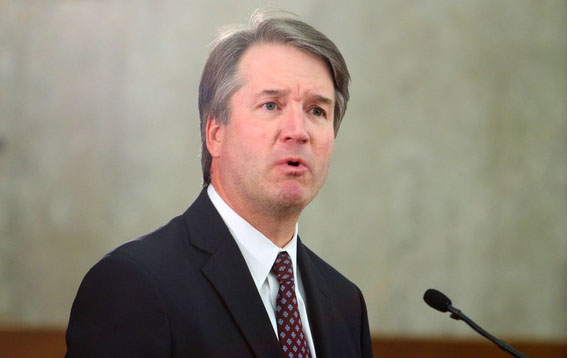(Reuters) – President Donald Trump said on Tuesday allegations of sexual misconduct against his U.S. Supreme Court nominee Brett Kavanaugh showed that “it’s a very scary time for young men in America” who now may be presumed guilty even when innocent.
Five days after an extraordinary Senate hearing watched by millions of people in which a university professor, Christine Blasey Ford, detailed her sexual assault allegation against Kavanaugh, Trump seemed to raise the issue of false accusations against men.
The fight over Kavanaugh’s nomination to a lifetime job on the top U.S. court comes against the backdrop of the #MeToo movement fighting sexual harassment and assault that has toppled a succession of powerful men.
Under pressure from moderate fellow Republicans, Trump on Friday ordered an FBI investigation lasting up to a week into the allegations against his nominee.
Trump told reporters on Tuesday he thought the conservative federal appeals court judge would win Senate confirmation once the FBI finishes its investigation.
“My whole life, I’ve heard you’re innocent until proven guilty. But now, you’re guilty until proven innocent. That is a very, very difficult standard,” Trump said outside the White House before leaving on a visit to Philadelphia.
“Well, I say that it’s a very scary time for young men in America when you can be guilty of something that you may not be guilty of,” he added.
The nomination has become a politically explosive issue ahead of Nov. 6 elections, when control of Congress is at stake. Some Republicans fear that pushing ahead with confirmation could alienate women voters, while Democrats seek to capitalize.
“What’s happening here has much more to do than even the appointment of a Supreme Court justice. It really does. You could be somebody that was perfect your entire life, and somebody could accuse you of something. It doesn’t necessarily have to be a woman,” Trump said.
Ford testified last Thursday that Kavanaugh sexually assaulted her in 1982 when they were high school students in Maryland. Kavanaugh denied the accusation, as well as allegations by two other women of sexual misconduct in the 1980s.
Senator Jeff Flake, a moderate Republican who could be pivotal in the confirmation vote, raised fresh concerns about the judge’s “partisan” tone at the Judiciary Committee hearing. “I was very troubled by the tone of the remarks. … The interaction with the members was sharp and partisan, and that concerns me,” Flake said.
“I tell myself, ‘You give a little leeway because of what he’s been through.’ But on the other hand, we can’t have this on the court. We simply can’t,” Flake, who is retiring as a senator in January, told an event in Washington hosted by The Atlantic magazine.
Kavanaugh struck an angry and defiant tone at the hearing. He called himself the victim of “a calculated and orchestrated political hit” by Democrats, lashing out at Democratic senators and frequently interrupting them.Flake voted to approve Kavanaugh in the committee’s vote on Friday that sent the nomination to the full Senate, but only after he requested that the FBI conduct an investigation of the sexual misconduct allegations. Trump subsequently ordered the investigation.
In comments aired on Sunday on CBS’s “60 Minutes,” Flake said Kavanaugh’s nomination would end if the FBI investigation found the nominee had lied in his Senate testimony.“I don’t think you should lie to Congress,” Trump said on Tuesday. “There have been a lot of people over the last year that have lied to Congress, and to me that would not be acceptable.”
Republicans control the Senate by a 51-49 margin. That means if all the Democrats vote against Kavanaugh, Trump could not afford to have more than one Republican oppose his nominee, with Vice President Mike Pence casting a tie-breaking vote.
Senate Majority Leader Mitch McConnell said each senator will get a copy of the FBI’s report on its investigation.“But here’s what we know … one thing for sure. The Senate will vote on Judge Kavanaugh here, on this floor, this week,” McConnell told the chamber.Senator Dianne Feinstein, the Judiciary Committee’s top Democrat, said a Friday vote on Kavanaugh would not give senators enough time to evaluate the FBI probe.
Flake said the FBI had completed interviews with four people. A lawyer for Kavanaugh’s friend Mark Judge said the FBI has finished its interview with him. Ford identified Judge as a witness to the alleged assault. Judge has previously denied any memory of such an incident.
A person familiar with the matter said the FBI questioned Deborah Ramirez, who has said Kavanaugh exposed himself to her at a party when both were Yale University students. She was questioned for more than two hours on Sunday and provided the FBI with a list of over 20 possible witnesses, the person said.
The FBI will also question Leland Keyser and P.J. Smyth, two people who Ford said were at the gathering of teenagers where Kavanaugh allegedly assaulted her. A third woman who has accused the judge of sexual misconduct in the 1980s, Julie Swetnick, was not on the initial list of witnesses to be interviewed.






